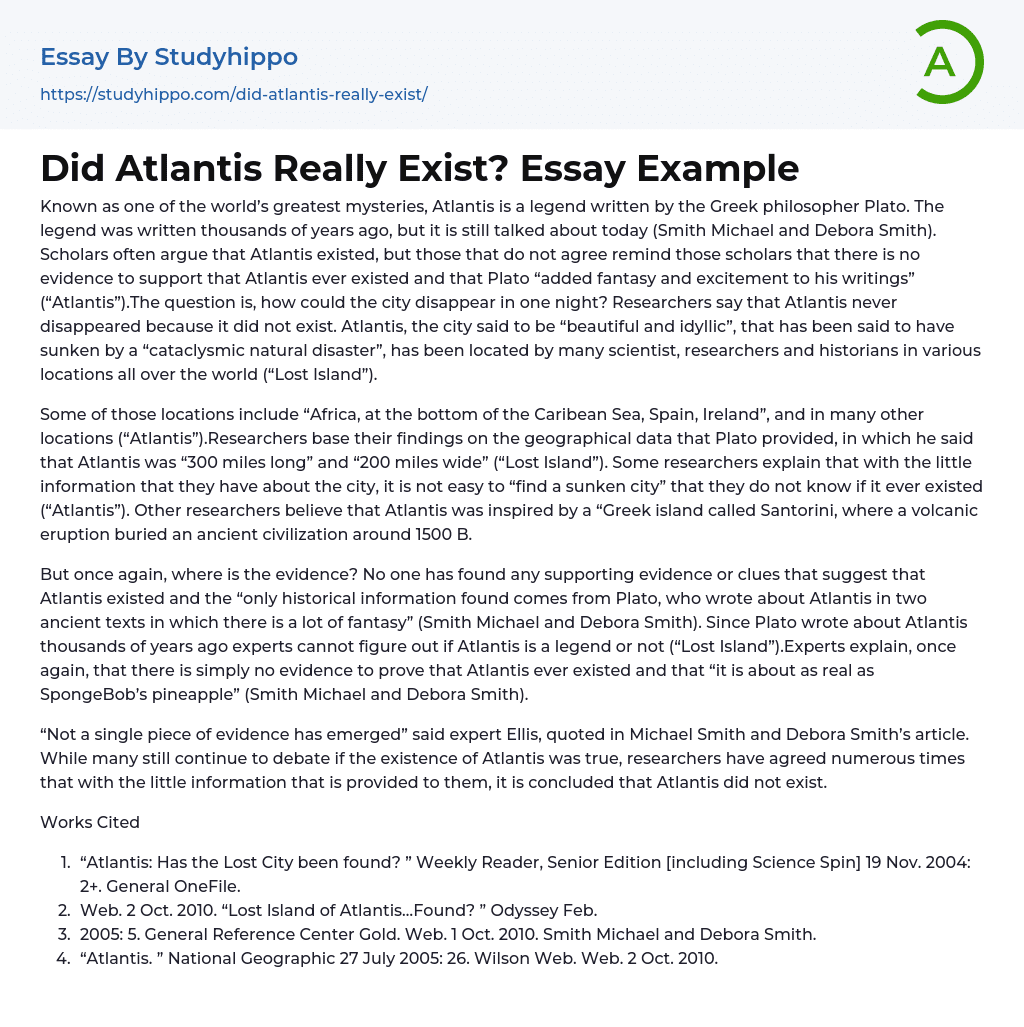Known as one of the world’s greatest mysteries, Atlantis is a legend written by the Greek philosopher Plato. The legend was written thousands of years ago, but it is still talked about today (Smith Michael and Debora Smith). Scholars often argue that Atlantis existed, but those that do not agree remind those scholars that there is no evidence to support that Atlantis ever existed and that Plato “added fantasy and excitement to his writings” (“Atlantis”).The question is, how could the city disappear in one night? Researchers say that Atlantis never disappeared because it did not exist. Atlantis, the city said to be “beautiful and idyllic”, that has been said to have sunken by a “cataclysmic natural disaster”, has been located by many scientist, researchers and historians in various locations all over the world (“Lost Island”).
Some of those locations
...include “Africa, at the bottom of the Caribean Sea, Spain, Ireland”, and in many other locations (“Atlantis”).Researchers base their findings on the geographical data that Plato provided, in which he said that Atlantis was “300 miles long” and “200 miles wide” (“Lost Island”). Some researchers explain that with the little information that they have about the city, it is not easy to “find a sunken city” that they do not know if it ever existed (“Atlantis”). Other researchers believe that Atlantis was inspired by a “Greek island called Santorini, where a volcanic eruption buried an ancient civilization around 1500 B.
But once again, where is the evidence? No one has found any supporting evidence or clues that suggest that Atlantis existed and the “only historical information found comes from Plato, who wrote about Atlantis in two ancient text
in which there is a lot of fantasy” (Smith Michael and Debora Smith). Since Plato wrote about Atlantis thousands of years ago experts cannot figure out if Atlantis is a legend or not (“Lost Island”).Experts explain, once again, that there is simply no evidence to prove that Atlantis ever existed and that “it is about as real as SpongeBob’s pineapple” (Smith Michael and Debora Smith).
“Not a single piece of evidence has emerged” said expert Ellis, quoted in Michael Smith and Debora Smith’s article. While many still continue to debate if the existence of Atlantis was true, researchers have agreed numerous times that with the little information that is provided to them, it is concluded that Atlantis did not exist.
Works Cited
- “Atlantis: Has the Lost City been found? ” Weekly Reader, Senior Edition [including Science Spin] 19 Nov. 2004: 2+. General OneFile.
- Web. 2 Oct. 2010. “Lost Island of Atlantis…Found? ” Odyssey Feb.
- 2005: 5. General Reference Center Gold. Web. 1 Oct. 2010. Smith Michael and Debora Smith.
- “Atlantis. ” National Geographic 27 July 2005: 26. Wilson Web. Web. 2 Oct. 2010.
- Accounting essays
- Marketing essays
- Automation essays
- Business Cycle essays
- Business Model essays
- Business Operations essays
- Business Software essays
- Corporate Social Responsibility essays
- Infrastructure essays
- Logistics essays
- Manufacturing essays
- Multinational Corporation essays
- Richard Branson essays
- Small Business essays
- Cooperative essays
- Family Business essays
- Human Resource Management essays
- Sales essays
- Market essays
- Online Shopping essays
- Selling essays
- Strategy essays
- Management essays
- Franchising essays
- Quality Assurance essays
- Business Intelligence essays
- Corporation essays
- Stock essays
- Shopping Mall essays
- Harvard Business School essays
- Harvard university essays
- Trade Union essays
- Cooperation essays
- News Media essays
- Waste essays
- Andrew Carnegie essays
- Inventory essays
- Customer Relationship Management essays
- Structure essays
- Starting a Business essays
- Accounts Receivable essays
- Auditor's Report essays
- Balance Sheet essays
- Costs essays
- Financial Audit essays
- International Financial Reporting Standards essays
- Tax essays
- Accountability essays
- Cash essays
- Principal essays




